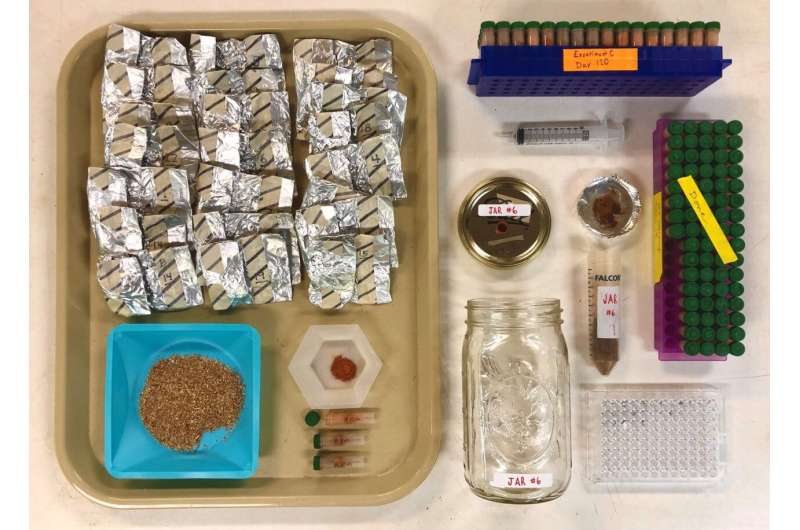This article has been reviewed according to Science X's editorial process and policies. Editors have highlighted the following attributes while ensuring the content's credibility:
fact-checked
peer-reviewed publication
proofread
Study explores an underappreciated way warmer temperatures will impact ecosystems: Decomposition

Our world is changing, and warming temperatures will alter our natural ecosystems. Some of these changes will be straightforward, like animal ranges creeping northward as they strive to maintain their ideal temperatures. But other changes will be more complicated, as warming sets off complex chain reactions that reverberate through these systems.
An important process in ecosystems is the decomposition of plant litter, in which dead plant material is broken down by animals, fungi, and microbes, making its nutrients accessible to the next generation of plants. How quickly this breakdown happens—the decomposition rate—is important for determining the capacity for our ecosystems to hold carbon, which ultimately influences carbon dioxide (an important greenhouse gas) levels in the atmosphere, a primary contributor to present-day warming.
How fast this decomposition occurs is known to be affected by the composition of the plant community itself—that is, which species are present and in which relative abundances—since different kinds of plants contain different types of nutrients. Just as you might find different nutrients in rice compared to wheat, when different plant species die, the nutrients their decomposed stems and leaves contribute to the ecosystem will vary.
Decomposition rates are also affected by the microbes that live in the soil, since different bacteria and fungi carry out decomposition at different rates. Meanwhile, warming temperatures can affect both plant and microbial communities.
In a new study led by Holden Arboretum ecologists Emma Dawson-Glass and Katie Stuble, researchers uncovered how microbes, plants, and warmer temperatures all interact to alter decomposition rates in a natural ecosystem. Their work was published in the journal Functional Ecology.
"Our study is exciting because scientists haven't extensively explored how changes in the plant and decomposer communities will interact under climate warming," says Emma Dawson-Glass, Research Specialist in the Stuble Community Ecology lab and lead author on the study. "Studying how decomposition is impacted by warming can help us better understand how the function of our environment is being altered by climate change. By improving our understanding of the changes caused by climate warming, we can also help to better inform climate intervention strategies."
The new study builds on previous work that demonstrated, through experimental warming in a prairie, that higher temperatures shifted the microbial community in a way that accelerated decomposition, but shifted the plant community in a way that decelerated decomposition. With both communities at work in nature, what do these conflicting processes mean for actual decomposition in ecosystems?
To find out, the team pit these factors against each other in lab experiments to see what happens to decomposition rates when the plants, microbes, and warming temperatures all interact.
They found that soil microbial and plant communities interacted in important ways. As expected, decomposition decreased when there was more of a slower-decomposing grass (Indian grass, Sorghastrum nutans)—but only when certain microbes were in the soil. When the soil microbes had been exposed to warming, more Indian grass didn't slow decomposition. This suggests that the microbial community actually shifted under warming in ways that make it better able to deal with more Indian grass, which itself is also more abundant under warming.
This shift in the way microbes function could mean that changes in soil microbial and plant communities could interact to mitigate changes in decomposition under warming. These results foster improved understanding of how warming will affect ecosystems, underscoring the importance of considering multiple concurrent processes in tandem in order to understand outcomes.
"The impacts of global warming are pervasive, but so incredibly nuanced," says Katie Stuble, Holden Forests & Gardens scientist and senior author on the paper. "The response of one element of the environment to warming is almost certainly influenced by simultaneous shifts in other elements. Sometimes these confounding changes may exacerbate the impacts of warming, but they may also mitigate the impacts."
"Unpacking the intricate ways in which warming will modify various aspects of the environment, but also how these changes will interact with one another, will be a critical step in understanding how climate change is reshaping the world now, as well as into the future," says Stuble.
More information: Emma Dawson‐Glass et al, Warming‐induced functional shifts in the decomposer community interact with plant community compositional shifts to impact litter decomposition, Functional Ecology (2023). DOI: 10.1111/1365-2435.14404
Journal information: Functional Ecology
Provided by Holden Forests & Gardens



















